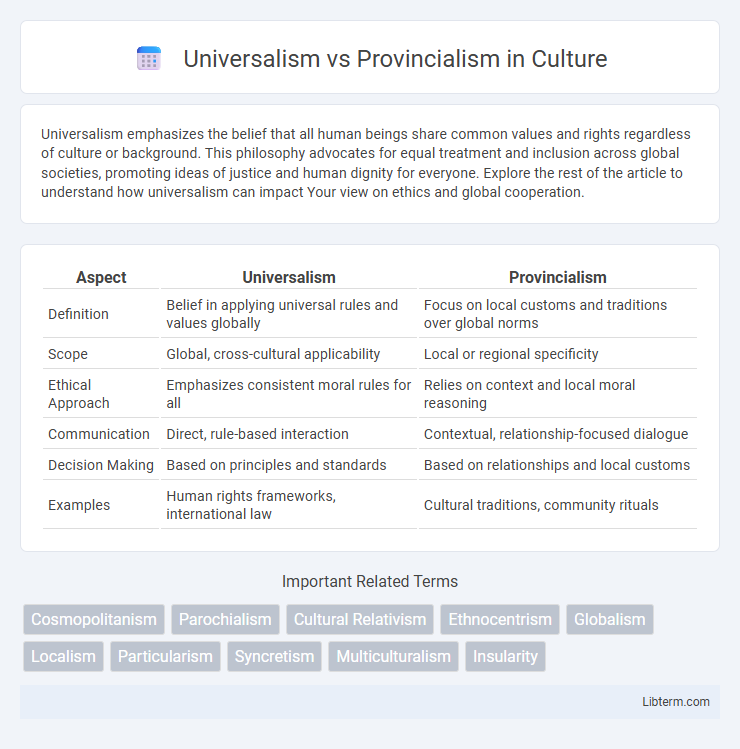Universalism emphasizes the belief that all human beings share common values and rights regardless of culture or background. This philosophy advocates for equal treatment and inclusion across global societies, promoting ideas of justice and human dignity for everyone. Explore the rest of the article to understand how universalism can impact Your view on ethics and global cooperation.
Table of Comparison
| Aspect | Universalism | Provincialism |
|---|---|---|
| Definition | Belief in applying universal rules and values globally | Focus on local customs and traditions over global norms |
| Scope | Global, cross-cultural applicability | Local or regional specificity |
| Ethical Approach | Emphasizes consistent moral rules for all | Relies on context and local moral reasoning |
| Communication | Direct, rule-based interaction | Contextual, relationship-focused dialogue |
| Decision Making | Based on principles and standards | Based on relationships and local customs |
| Examples | Human rights frameworks, international law | Cultural traditions, community rituals |
Introduction to Universalism and Provincialism
Universalism emphasizes the application of universal values and principles across cultures and societies, advocating for global standards in ethics and human rights. Provincialism prioritizes local customs, traditions, and perspectives, often resisting external influences and highlighting cultural specificity. Understanding the balance between universalism and provincialism is crucial for fostering respectful intercultural dialogue and cooperation.
Defining Universalism: Key Concepts and Principles
Universalism emphasizes the application of universal principles and values that transcend individual cultures, advocating for human rights, equality, and ethical standards applicable to all people. It centers on concepts like universal human dignity, moral objectivity, and global justice, promoting inclusivity irrespective of geographic or cultural boundaries. This approach contrasts with provincialism by fostering a worldview that seeks commonality across societies rather than focusing solely on local or regional traditions.
Understanding Provincialism: Main Features and Perspectives
Provincialism refers to a mindset characterized by a narrow focus on local customs, traditions, and interests, often resisting external influences or broader universal principles. It emphasizes regional identity, prioritizing community-specific values over global or universal norms. This perspective can lead to cultural preservation but may also hinder intercultural understanding and cooperation in an increasingly interconnected world.
Historical Origins of Universalism and Provincialism
Universalism originated in ancient philosophical and religious traditions, emphasizing the inherent value and rights of all human beings regardless of cultural or geographic boundaries. Provincialism emerged from localized social and political contexts, prioritizing the interests, customs, and identities of specific regions or communities over global perspectives. Historical conflicts between universalist ideologies, such as those in Enlightenment thought, and provincialist movements reflect ongoing tensions between global integration and local identity preservation.
Universalism in Global Ethics and Human Rights
Universalism in global ethics asserts that human rights are inherent, inalienable, and applicable to all individuals regardless of cultural or national differences, emphasizing universal moral standards. This perspective underlines the universality of fundamental rights such as freedom, equality, and dignity as enshrined in international frameworks like the Universal Declaration of Human Rights. Upholding universalism encourages international cooperation, accountability, and the protection of vulnerable populations across diverse societies.
Provincialism in Cultural Identity and Tradition
Provincialism in cultural identity emphasizes deep-rooted local traditions and values that resist global homogenization, preserving unique customs and social norms within a specific geographic area. This focus nurtures a strong sense of community belonging and cultural continuity, often prioritizing indigenous languages, folklore, and rituals over universal or cosmopolitan influences. The retention of provincialism fosters cultural diversity by reinforcing distinct identities that contribute to the global mosaic of human heritage.
Universalism vs Provincialism in Political Thought
Universalism in political thought advocates for principles and policies that apply universally across different societies, emphasizing global human rights, equality, and common values. Provincialism, by contrast, prioritizes local customs, traditions, and specific cultural identities, often resisting external influences and universal norms. The tension between universalism and provincialism shapes debates on sovereignty, multiculturalism, and the scope of political obligations beyond national borders.
Case Studies: Universalism and Provincialism in Practice
Case studies of universalism and provincialism reveal how global ethical principles often clash with local customs and regulations, impacting international business and diplomatic relations. For example, multinational corporations frequently face challenges when applying universal human rights standards in regions where local laws or cultural norms contradict these principles. Such conflicts necessitate strategic adaptations that balance respect for provincial identities with adherence to universal ethical frameworks.
Challenges and Criticisms of Universalism and Provincialism
Universalism faces criticism for imposing a singular set of values that may ignore cultural diversity and marginalize local identities, leading to ethical imperialism. Provincialism challenges universalism by emphasizing particularism and local context, but it can create fragmentation and hinder global cooperation. Both perspectives struggle with balancing inclusivity and respecting cultural specificity, complicating ethical decision-making in a globalized world.
Conclusion: The Future of Universalism and Provincialism
The future of universalism and provincialism hinges on the dynamic interplay between global interconnectedness and local identity preservation. As technological advancements and cultural exchanges accelerate, universalist principles promoting shared human values coexist with provincialist efforts to safeguard regional traditions. Balancing these forces requires adaptive frameworks that integrate inclusive policies with respect for diverse local contexts, ensuring sustainable social cohesion in an increasingly complex world.
Universalism Infographic

 libterm.com
libterm.com